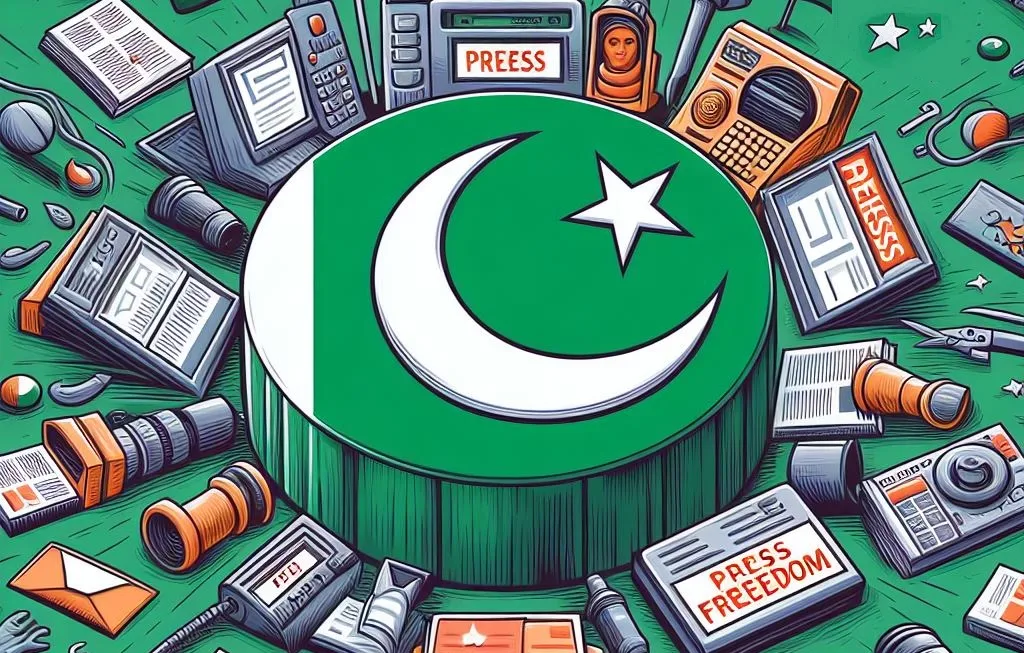In recent times, the intricate dance between the state and the media in Pakistan has experienced a subtle but undeniable discord, marked by a surge in censorship, assaults on journalists, and a discernible reluctance on the part of the government to embrace constructive criticism—a narrative meticulously unraveled in a comprehensive report.
This report stands as a chapter in the ongoing saga of digital journalism, carefully chronicled by the Institute of Research, Advocacy, and Development (IRADA). Muhammad Aftab Alam, steering the ship at IRADA as the Executive Director, has cast a spotlight on the pivotal legislative shifts in Pakistan during the transformative year of 2023, offering insights into the evolving landscape of freedom of expression, access to information, and the digital media terrain.
Venturing into the labyrinth of judicial decisions and their ramifications on the broader canvas of freedom of expression, the report unfurls the nuances of court judgments, which, like a delicate dance, sometimes shield and at other times impose constraints. It raises a red flag on the diminishing credibility of courts, citing instances where restrictive interpretations of laws erode the very foundations of freedom of expression. Saroop Ijaz, lending his voice from the corridors of Human Rights Watch, injects a poignant observation into the report—a fundamental mistrust of free speech embedded in the post-colonial state structure, a landscape where citizens find themselves burdened with proving exceptions rather than enjoying the luxury of a presumption in favor of free speech.
Former Senator Farhatullah Babar, adding his brushstrokes to the report's canvas, portrays a landscape of challenges faced by digital journalism in Pakistan, with legislative vacuums, flawed statutes, and a lackadaisical implementation of existing laws casting shadows.
The report, akin to a vigilant sentinel, raises an alarm over the realms of press freedom, transparency, and due process, highlighting specific instances of journalist detentions—names like Imran Riaz Khan and Khalid Jamil entangled in the intricate web woven by the Federal Investigation Agency (FIA).
In a revelation that unveils the contours of a shifting digital landscape, the report uncovers a noteworthy volume of content removal requests, dispatched by the Pakistani government to the tech companies such as Meta, Google, X (Twitter) and TikTok. For instance, Meta, with a flick of its algorithmic wand, restricted access to 12,001 items in Pakistan between January 2021 and June 2022, in response to the orchestrated symphony of complaints orchestrated by the Pakistan Telecommunication Authority (PTA), alleging breaches of local laws.
Citing a digital rights symphony played by AccessNow on the global stage, the report strikes a somber note, revealing six instances of internet/network shutdowns across Pakistan between 2022 and 2023—tunes orchestrated under the baton of governmental directives.
Photo: AIgen
Read next: Beware! Saying "You're So Smart!" to Children Can Make Them Worse at Math
This report stands as a chapter in the ongoing saga of digital journalism, carefully chronicled by the Institute of Research, Advocacy, and Development (IRADA). Muhammad Aftab Alam, steering the ship at IRADA as the Executive Director, has cast a spotlight on the pivotal legislative shifts in Pakistan during the transformative year of 2023, offering insights into the evolving landscape of freedom of expression, access to information, and the digital media terrain.
Venturing into the labyrinth of judicial decisions and their ramifications on the broader canvas of freedom of expression, the report unfurls the nuances of court judgments, which, like a delicate dance, sometimes shield and at other times impose constraints. It raises a red flag on the diminishing credibility of courts, citing instances where restrictive interpretations of laws erode the very foundations of freedom of expression. Saroop Ijaz, lending his voice from the corridors of Human Rights Watch, injects a poignant observation into the report—a fundamental mistrust of free speech embedded in the post-colonial state structure, a landscape where citizens find themselves burdened with proving exceptions rather than enjoying the luxury of a presumption in favor of free speech.
Former Senator Farhatullah Babar, adding his brushstrokes to the report's canvas, portrays a landscape of challenges faced by digital journalism in Pakistan, with legislative vacuums, flawed statutes, and a lackadaisical implementation of existing laws casting shadows.
The report, akin to a vigilant sentinel, raises an alarm over the realms of press freedom, transparency, and due process, highlighting specific instances of journalist detentions—names like Imran Riaz Khan and Khalid Jamil entangled in the intricate web woven by the Federal Investigation Agency (FIA).
In a revelation that unveils the contours of a shifting digital landscape, the report uncovers a noteworthy volume of content removal requests, dispatched by the Pakistani government to the tech companies such as Meta, Google, X (Twitter) and TikTok. For instance, Meta, with a flick of its algorithmic wand, restricted access to 12,001 items in Pakistan between January 2021 and June 2022, in response to the orchestrated symphony of complaints orchestrated by the Pakistan Telecommunication Authority (PTA), alleging breaches of local laws.
Citing a digital rights symphony played by AccessNow on the global stage, the report strikes a somber note, revealing six instances of internet/network shutdowns across Pakistan between 2022 and 2023—tunes orchestrated under the baton of governmental directives.
Photo: AIgen
Read next: Beware! Saying "You're So Smart!" to Children Can Make Them Worse at Math
